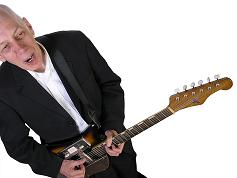|
Rod Clements saw considerable chart success with folk-rockers Lindisfarne, penning their hit Meet Me On The Corner. He currently works as a solo artist and with his band, The Ghosts of Electricity. He also collborates with other musical kindred spirits and has worked with the late, great Bert Jansch, Michael Chapman, Rachel Harrington and Rab Noakes, among others. We trust you’ll enjoy the latest of Rod’s regular musings in which you’ll find he’s
NICELY OUT OF TUNE

In 1991 I flew to the Soviet Republic of Belarus, in a motley planeload of musicians, roadies and hangers-on, to play in the Minsk Dynamo football stadium on behalf of the ‘Children of Chernobyl’ – the young victims of the nuclear disaster that had occurred just across the border in Ukraine five years previously. None of us really knew what to expect, although we’d been given a few hints – “Bring everything you will need”, for instance. There was little point bringing Western currency, as it was virtually illegal and could only be used in tourist outlets where locals weren’t allowed. We were advised to take a plentiful supply of small luxuries – cigarettes, chewing gum, ballpoint pens and such like – to give away as tips.
The country’s economic plight was obvious from the moment we arrived. The bus that took us to our hotel was falling apart, thanks to the crumbling and cratered roads. We saw queues in the streets and empty shelves in the shops. Most of the items on the hotel restaurant menu were unavailable. But people were getting along as best they could: it might be broken, but maybe it could be bodged together; it might not be on the shelf, but somebody knew somebody who could get one.
Once, a group of us were stranded in downtown Minsk with no taxis available. Pushed for time, our guide picked out a car from the passing traffic, flagged it down and had a word with the driver. We piled into the beat-up Volga for a lift back to the hotel. (The guide was horrified when I gave the driver a whole pack of Marlboro in thanks – apparently half the pack would have been enough.)
Staging the concert was a miracle of making-do and mending. Despite difficulties with language and equipment, the crews worked long hours in a spirit of co-operation that put the United Nations to shame and eventually the show went ahead. A capacity crowd in the stadium witnessed the rare spectacle of artists from either side of the Iron Curtain sharing the same stage as the music blasted out into the night.
There was a heady optimism in the air, a euphoria that was not just down to the cheap vodka. It was only two years since the Berlin Wall had fallen, and throughout the former Eastern Bloc countries there was a sense that their time, too, would soon come. Sadly for Belarus, those hopes have not been fulfilled. It is now Europe’s last Soviet-style dictatorship, its elections regularly failing to meet international standards, and the last European country to retain (and use) the death penalty. Protests and peaceful demonstrations are violently suppressed. And all this is only a two and a half hour flight from London.
Recently I read an interview with Natalia Kaliada, founder of Belarus Free Theatre, in which she related that in a worsening situation, “now even rock concerts are banned”.
She should know. It’s only when they’re away from their own country that she and her company can work freely; at home they have to stage guerilla performances in private homes or the forests, their members risking torture and imprisonment. At least they have some high-profile supporters in the international theatrical world – Joanna Lumley, Jude Law and Tom Stoppard among them.
It would be nice if some similarly illustrious names from the rock firmament could come out in support of their silenced fellow artists in Belarus, but you could be forgiven for thinking that such luminaries only join together nowadays to celebrate the continuance of our own institutions.
|